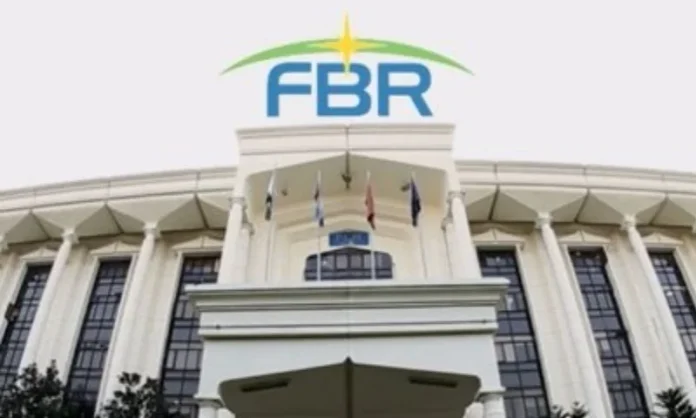The Federal Board of Revenue (FBR) has issued new procedures to govern the registration of e-commerce sellers and the collection of tax on digital transactions. These measures are part of a broader effort to bring the retail market into the tax net and ensure tax compliance for digitally ordered goods and services.
The FBR has released Income Tax Circular No. 01 and Sales Tax Circular No. 02, which aim to streamline the process of assigning National Tax Numbers (NTNs) to e-commerce retailers and to implement a practical withholding tax system. Under the new regime, all payments received for digitally ordered goods or services — whether via an online marketplace (OMP) or a website — will be subject to tax, with the introduction of Section 6A to tax domestic e-commerce transactions.
In line with the changes to Section 153(2A), payment intermediaries —including banks, financial institutions, forex dealers, and digital gateways — will now be required to withhold a 1pc tax on e-commerce transactions.
Couriers handling cash-on-delivery (CoD) transactions are mandated to deduct a 2pc tax before remitting payments to sellers. The differential tax rates aim to incentivise the use of digital payments as part of the broader goal to transition to a cashless economy.
The tax collected under Section 6A will be treated as a final tax on income earned by sellers from both domestic and export transactions.
FBR requires sellers to register and imposes WHT on digital deals to promote cashless economy
Payment intermediaries and courier services are responsible for collecting this tax in the name of each seller, depositing it monthly into the national treasury, and submitting the required withholding tax statements.
As part of the new regime, e-commerce sellers are now legally required to register for income tax. Online marketplaces (OMPs) and courier services are prohibited from providing services to unregistered sellers.
Additionally, OMPs are obligated to file periodic statements detailing the vendors operating on their platforms. Penalties have been introduced for non-compliance, including fines for OMPs and courier services failing to withhold tax or meet registration requirements.
For vendors operating e-stores or mobile apps with CoD payments, the courier service — whether an aggregator, an OMP, or a direct delivery provider — will bear responsibility for tax collection and reporting obligations, regardless of whether the vendor operates through an OMP or independently. Under the sales tax framework, couriers have been designated as withholding agents to capture taxable activity in the e-commerce sector.
The government has also introduced provisions to tighten sales tax compliance. Under Section 3(7A), tax collected by intermediaries and couriers on digitally ordered goods will be treated as the final liability for cottage industries and non-tier-1 retailers, with no input tax allowed on such supplies.
Other businesses will continue under the standard sales tax regime, where withheld tax is adjustable against their output tax.
In addition, amendments to Sections 14(1A) and 14(1B) now require all e-commerce vendors — including non-residents selling goods digitally within or from Pakistan via online marketplaces — to register and comply with the sales tax framework.
Furthermore, amendments to Section 26 require OMPs, payment intermediaries, and couriers to file monthly sales tax statements, detailing supplier-wise payments, tax dues, and other prescribed data for domestic digital transactions.
These changes are aimed at improving tax compliance in the e-commerce sector and supporting the government’s shift towards a digital economy.
The FBR has released Income Tax Circular No. 01 and Sales Tax Circular No. 02, which aim to streamline the process of assigning National Tax Numbers (NTNs) to e-commerce retailers and to implement a practical withholding tax system. Under the new regime, all payments received for digitally ordered goods or services — whether via an online marketplace (OMP) or a website — will be subject to tax, with the introduction of Section 6A to tax domestic e-commerce transactions.
In line with the changes to Section 153(2A), payment intermediaries —including banks, financial institutions, forex dealers, and digital gateways — will now be required to withhold a 1pc tax on e-commerce transactions.
Couriers handling cash-on-delivery (CoD) transactions are mandated to deduct a 2pc tax before remitting payments to sellers. The differential tax rates aim to incentivise the use of digital payments as part of the broader goal to transition to a cashless economy.
The tax collected under Section 6A will be treated as a final tax on income earned by sellers from both domestic and export transactions.
FBR requires sellers to register and imposes WHT on digital deals to promote cashless economy
Payment intermediaries and courier services are responsible for collecting this tax in the name of each seller, depositing it monthly into the national treasury, and submitting the required withholding tax statements.
As part of the new regime, e-commerce sellers are now legally required to register for income tax. Online marketplaces (OMPs) and courier services are prohibited from providing services to unregistered sellers.
Additionally, OMPs are obligated to file periodic statements detailing the vendors operating on their platforms. Penalties have been introduced for non-compliance, including fines for OMPs and courier services failing to withhold tax or meet registration requirements.
For vendors operating e-stores or mobile apps with CoD payments, the courier service — whether an aggregator, an OMP, or a direct delivery provider — will bear responsibility for tax collection and reporting obligations, regardless of whether the vendor operates through an OMP or independently. Under the sales tax framework, couriers have been designated as withholding agents to capture taxable activity in the e-commerce sector.
The government has also introduced provisions to tighten sales tax compliance. Under Section 3(7A), tax collected by intermediaries and couriers on digitally ordered goods will be treated as the final liability for cottage industries and non-tier-1 retailers, with no input tax allowed on such supplies.
Other businesses will continue under the standard sales tax regime, where withheld tax is adjustable against their output tax.
In addition, amendments to Sections 14(1A) and 14(1B) now require all e-commerce vendors — including non-residents selling goods digitally within or from Pakistan via online marketplaces — to register and comply with the sales tax framework.
Furthermore, amendments to Section 26 require OMPs, payment intermediaries, and couriers to file monthly sales tax statements, detailing supplier-wise payments, tax dues, and other prescribed data for domestic digital transactions.
These changes are aimed at improving tax compliance in the e-commerce sector and supporting the government’s shift towards a digital economy.
































